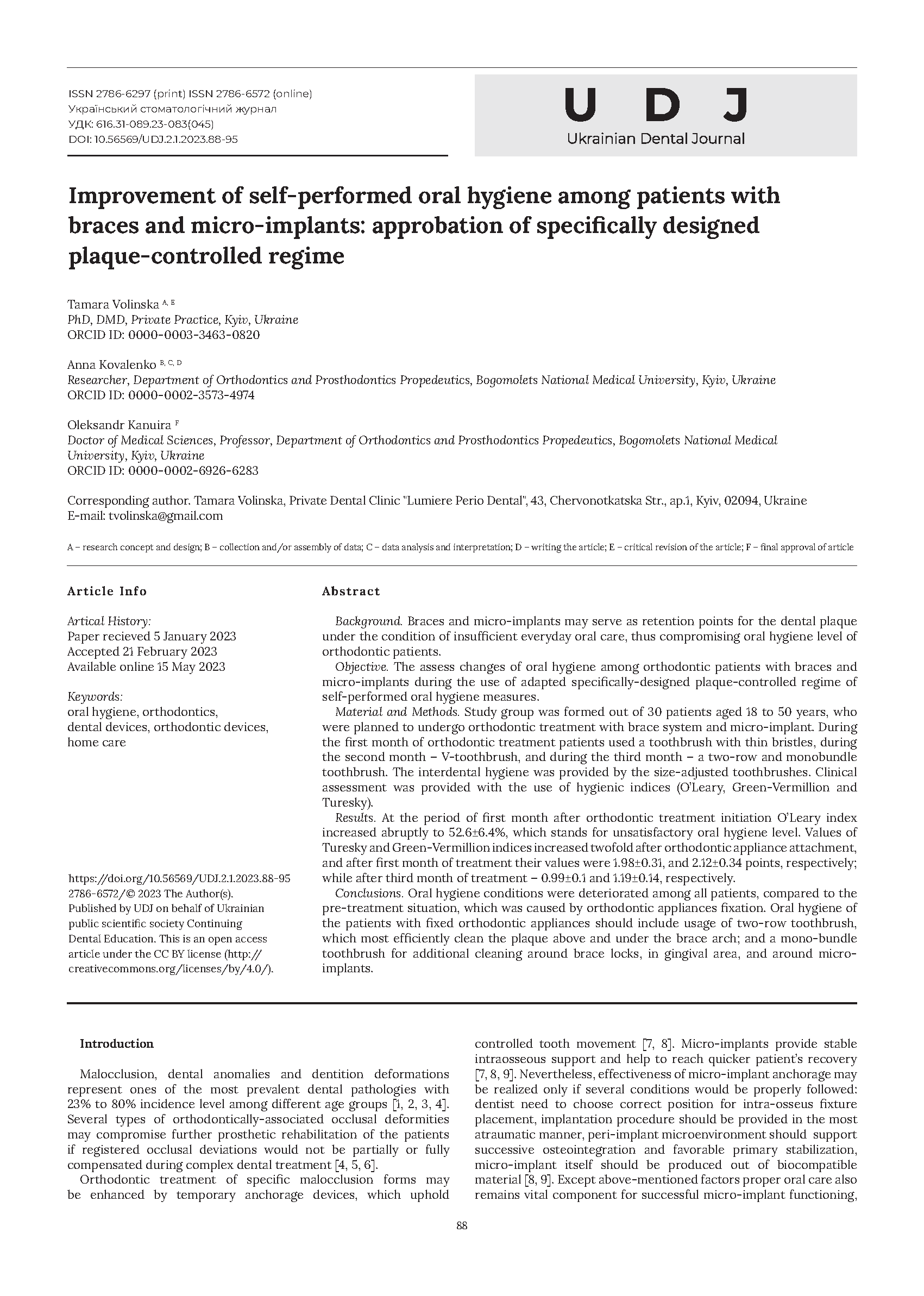Improvement of self-performed oral hygiene among patients with braces and micro-implants: approbation of specifically designed plaque-controlled regime
DOI:
https://doi.org/10.56569/UDJ.2.1.2023.88-95Keywords:
oral hygiene, orthodontics, dental devices, orthodontic devices, home careAbstract
Background. Braces and micro-implants may serve as retention points for the dental plaque under the condition of insufficient everyday oral care, thus compromising oral hygiene level of orthodontic patients.
Objective. The assess changes of oral hygiene among orthodontic patients with braces and micro-implants during the use of adapted specifically-designed plaque-controlled regime of self-performed oral hygiene measures.
Material and Methods. Study group was formed out of 30 patients aged 18 to 50 years, who were planned to undergo orthodontic treatment with brace system and micro-implant. During the first month of orthodontic treatment patients used a toothbrush with thin bristles, during the second month – V-toothbrush, and during the third month – a two-row and monobundle toothbrush. The interdental hygiene was provided by the size-adjusted toothbrushes. Clinical assessment was provided with the use of hygienic indices (O’Leary, Green-Vermillion and Turesky).
Results. At the period of first month after orthodontic treatment initiation O’Leary index increased abruptly to 52.6±6.4%, which stands for unsatisfactory oral hygiene level. Values of Turesky and Green-Vermillion indices increased twofold after orthodontic appliance attachment, and after first month of treatment their values were 1.98±0.31, and 2.12±0.34 points, respectively; while after third month of treatment – 0.99±0.1 and 1.19±0.14, respectively.
Conclusions. Oral hygiene conditions were deteriorated among all patients, compared to the pre-treatment situation, which was caused by orthodontic appliances fixation. Oral hygiene of the patients with fixed orthodontic appliances should include usage of two-row toothbrush, which most efficiently clean the plaque above and under the brace arch; and a mono-bundle toothbrush for additional cleaning around brace locks, in gingival area, and around micro-implants.
References
Fernandez CC, Pereira CV, Luiz RR, Vieira AR, De Castro Costa M. Dental anomalies in different growth and skeletal malocclusion patterns. Angle Orthod. 2018;88(2):195-201. doi: https://doi.org/10.2319/071917-482.1
Bilge NH, Yeşiltepe S, Ağırman KT, Çağlayan F, Bilge OM. Investigation of prevalence of dental anomalies by using digital panoramic radiographs. Folia Morphol. 2018;77(2):323-8. doi: https://doi.org/10.5603/FM.a2017.0087
Alhammadi MS, Halboub E, Fayed MS, Labib A, El-Saaidi C. Global distribution of malocclusion traits: A systematic review. Dental Press J Orthod. 2018;23:40.e1-40.e10. doi: https://doi.org/10.1590/2177-6709.23.6.40.e1-10.onl
Lombardo G, Vena F, Negri P, Pagano S, Barilotti C, Paglia L, Colombo S, Orso M, Cianetti S. Worldwide prevalence of malocclusion in the different stages of dentition: A systematic review and meta-analysis. Eur J Paediatr Dent. 2020;21(2):115-22. doi: https://doi.org/10.23804/ejpd.2020.21.02.05
Khalaf K, Kheder W, El-Kishawi M, AlQahtani HA, Ghiasi FS, Alabdulkareem MN, Zahiri AN, Rahmani NI. The role of prosthetic, orthodontic and implant-supported rehabilitation in the management of secondary malocclusion to maxillofacial trauma-A systematic review. Saudi Dent J. 2021;33(4):177-83. doi: https://doi.org/10.1016/j.sdentj.2020.12.004
Rivis O, Potapchuk A, Goncharuk-Khomyn M, Bokoch A. Use of Mini-Implant Anchorage For Second Molar Mesialization: Comprehensive Approach For Treatment Efficiency Analysis. Pesqui Bras Odontopediatria Clin Integr. 2020;20:e5262. doi: https://doi.org/10.1590/pboci.2020.018
Jaramillo-Bedoya D, Villegas-Giraldo G, Agudelo-Suárez AA, Ramírez-Ossa DM. A scoping review about the characteristics and success-failure rates of temporary anchorage devices in orthodontics. Dent J. 2022;10(5):78. doi: https://doi.org/10.3390/dj10050078
Umalkar SS, Jadhav Sr VV, Paul P, Reche A, Jadhav VV. Modern Anchorage Systems in Orthodontics. Cureus. 2022 Nov 14;14(11):e31476. doi: https://doi.org/10.7759/cureus.31476
Jones JP, Elnagar MH, Perez DE. Temporary skeletal anchorage techniques. Oral Maxillofac Surg Clin North Am. 2020;32(1):27-37. doi: https://doi.org/10.1016/j.coms.2019.08.003
Zhao NR, Guo YN, Cui SJ, Tian YJ, Zhou YH, Wang XD. Microbiological Advances in Orthodontics: An Overview and Detailed Analysis of Temporary Anchorage Devices. Curr Med Sci. 2022;42(6):1157-1163. doi: https://doi.org/10.1007/s11596-022-2653-x
Zhao N, Zhang Q, Guo Y, Cui S, Tian Y, Zhang Y, Zhou Y, Wang X. Oral microbiome contributes to the failure of orthodontic temporary anchorage devices (TADs). BMC Oral Health. 2023;23(1):22. doi: https://doi.org/10.1186/s12903-023-02715-7
Chhibber A, Agarwal S, Yadav S, Kuo CL, Upadhyay M. Which orthodontic appliance is best for oral hygiene? A randomized clinical trial. Am J Orthod Dentofacial Orthop. 2018;153(2):175-83. doi: https://doi.org/10.1016/j.ajodo.2017.10.009
Kumar S, Kumar S, Hassan N, Anjan R, Shaikh S. Bhowmick D., 2021. A comparative assessment of the effect of professional oral hygiene measures on the periodontal health of patients undergoing fixed orthodontic appliance therapy. J Pharm Bioallied Sci. 2021;13(Suppl 2): S1324-S1326. doi: https://doi.org/10.4103/jpbs.jpbs_141_21
Kozak U, Sękowska A, Chałas R. The effect of regime oral-hygiene intervention on the incidence of new white spot lesions in teenagers treated with fixed orthodontic appliances. Int J Environ Res Public Health. 2020;17(24):9460. doi: https://doi.org/10.3390/ijerph17249460
Buschang PH, Chastain D, Keylor CL, Crosby D, Julien KC. Incidence of white spot lesions among patients treated with clear aligners and traditional braces. Angle Orthod. 2019;89(3):359-64. doi: https://doi.org/10.2319/073118-553.1
Contaldo M, Lucchese A, Lajolo C, Rupe C, Di Stasio D, Romano A, Petruzzi M, Serpico R. The oral microbiota changes in orthodontic patients and effects on oral health: An overview. J Clin Med. 2021;10(4):780. doi: https://doi.org/10.3390/jcm10040780
Lucchese A, Bondemark L, Marcolina M, Manuelli M. Changes in oral microbiota due to orthodontic appliances: a systematic review. J Oral Microbiol. 2018;10(1):1476645. doi: https://doi.org/10.1080/20002297.2018.1476645
Ghaferi AA, Schwartz TA, Pawlik TM. STROBE reporting guidelines for observational studies. JAMA Surg. 2021;156(6):577-8. doi: https://doi.org/10.1001/jamasurg.2021.0528
Mahesh HV, Ramya KS. Screening the periodontal status in a group of population by using periowise® periodontal screening and recording system. J Adv Med Dent Sci Res. 2020;8(1):11-8. doi: https://doi.org/10.21276/jamdsr
Saffarzadeh A, Khodarahmi N, Mohammadi M. Evaluation of the Effect of Ultra-Soft Toothbrushes with Different Commercial Brands on Plaque and Bleeding Indices. J Dent. 2021;22(1):53-59. doi: https://doi.org/10.30476/DENTJODS.2020.83259.1044.
Soldo M, Matijević J, Ivanišević AM, Čuković-Bagić I, Marks L, Borić DN, Krmek SJ. Impact of oral hygiene instructions on plaque index in adolescents. Cent Eur J Public Health. 2020;28(2):103-7. doi: https://doi.org/10.21101/cejph.a5066
Woo JM, Sin SC, Cho JW, Eom KH, Kim HS, Lee MG, Lee MY. Clinical study on the comparison of various types of the dental plaque indices. Int J Clin Prev Dent. 2007;3(2):111-21. doi: https://doi.org/10.15236/ijcpd.2014.10.4.227
Discepoli N, Mirra R, Marruganti C, Beneforti C, Doldo T. Efficacy of Behaviour Change Techniques to improve oral hygiene control of individuals undergoing orthodontic therapy. A systematic review. Int J Dent Hyg. 2021;19(1):3-17. doi: https://doi.org/10.1111/idh.12468
ElShehaby M, Mofti B, Montasser MA, Bearn D. Powered vs manual tooth brushing in patients with fixed orthodontic appliances: a systematic review and meta-analysis. Am J Orthod Dentofacial Orthop. 2020;158(5):639-49. doi: https://doi.org/10.1016/j.ajodo.2020.04.018
Ali US, Sukhia RH, Fida M. A comparison of three different modalities in improving oral hygiene in adult orthodontic patients–An open label randomized controlled trial. Int Orthod. 2022;20(3):100669. doi: https://doi.org/10.1016/j.ortho.2022.100669
Bakar NA, Jayah NI, Mohamed NR, Ali SM, Nasir SH, Hashim R, Kharuddin AF. The effectiveness of pure Stichopus horrens extract toothpaste in reducing plaque-induced gingivitis following orthodontic bonding: A triple-blinded randomized controlled trial. J World Fed Orthod. 2020;9(1):3-8. doi: https://doi.org/10.1016/j.ejwf.2019.11.004
Ng E, Lim LP. An overview of different interdental cleaning aids and their effectiveness. Dent J. 2019;7(2):56. doi: https://doi.org/10.3390/dj7020056
Subramanya AP, Prabhuji ML. Comparative evaluation of efficacy and patient‐reported outcome measures of oral hygiene instruction methods for calibrated interdental brush. Int J Dent Hyg. 2021;19(3):287-94. doi: https://doi.org/10.1111/idh.12530
Wehner C, Husejnagic S, Laky B, Rausch-Fan X, Moritz A, Haririan H. Effect of interdental brush design on plaque during nonsurgical periodontal therapy. Clin Oral Investig. 2021;25:87-94. doi: https://doi.org/10.1007/s00784-020-03337-x
Marçal FF, Mota de Paulo JP, Barreto LG, de Carvalho Guerra LM, Silva PG. Effectiveness of orthodontic toothbrush versus conventional toothbrush on plaque and gingival index reduction: a systematic review and meta‐analysis. Int J Dent Hyg. 2022;20(1):87-99. doi: https://doi.org/10.1111/idh.12511
Goh H, Doubleday B. Aids for mechanical cleaning of teeth with fixed braces. The Cochrane Database of Syst Rev. 2018;2018(1):CD012931. doi: https://doi.org/10.1002/14651858.CD012931
Oliveira LM, Pazinatto J, Zanatta FB. Are oral hygiene instructions with aid of plaque‐disclosing methods effective in improving self‐performed dental plaque control? A systematic review of randomized controlled trials. Int J Dental Hyg. 2021;19(3):239-54. doi: https://doi.org/10.1111/idh.12491
Ross MC, Campbell PM, Tadlock LP, Taylor RW, Buschang PH. Effect of automated messaging on oral hygiene in adolescent orthodontic patients: a randomized controlled trial. Angle Orthod. 2019;89(2):262-7. doi: https://doi.org/10.2319/040618-260.1

Downloads
Published
Issue
Section
Categories
License
Copyright (c) 2023 The Author(s)

This work is licensed under a Creative Commons Attribution 4.0 International License.








